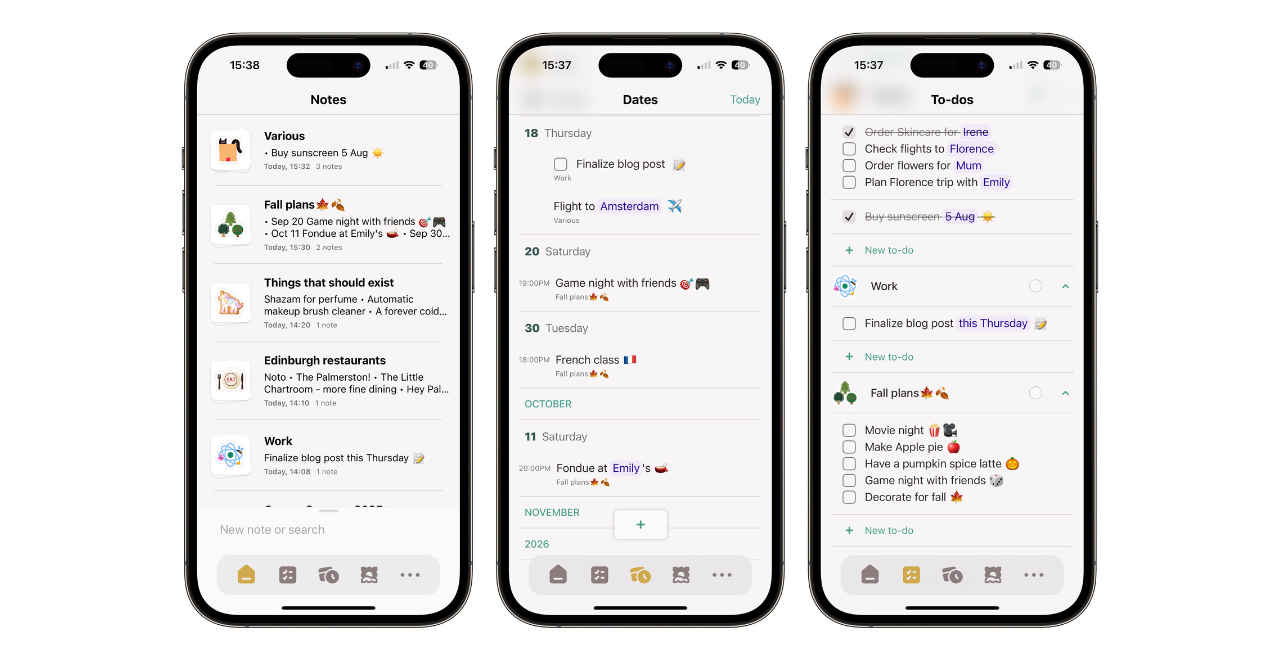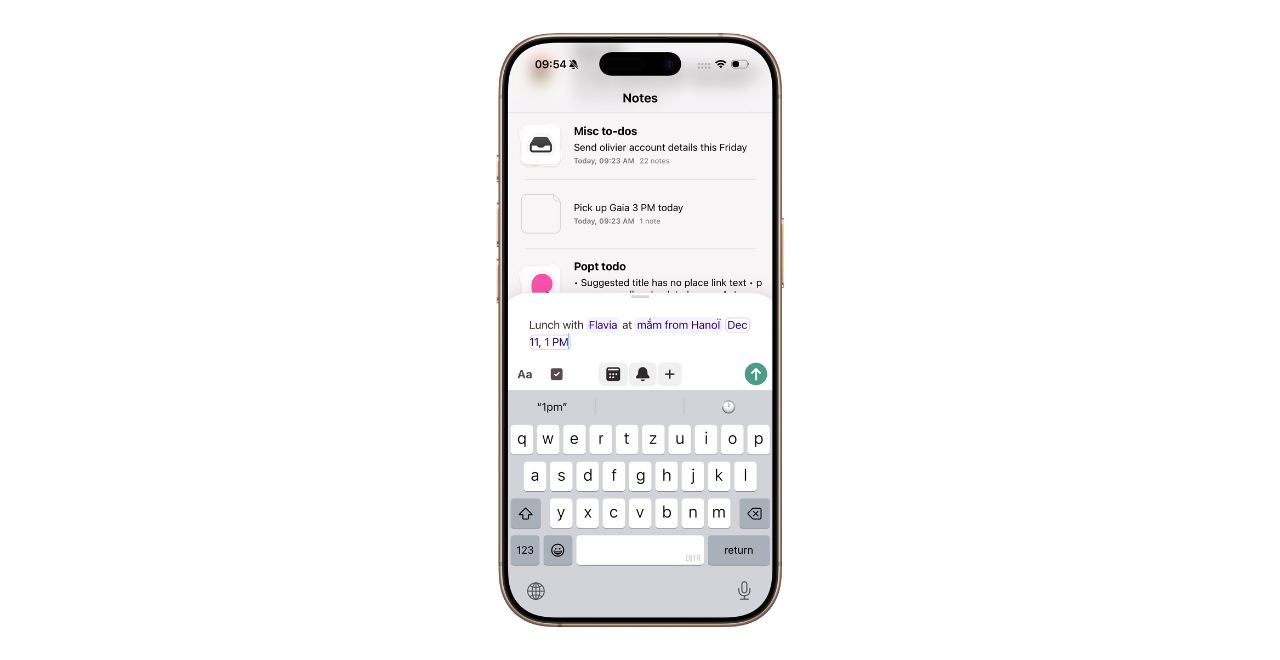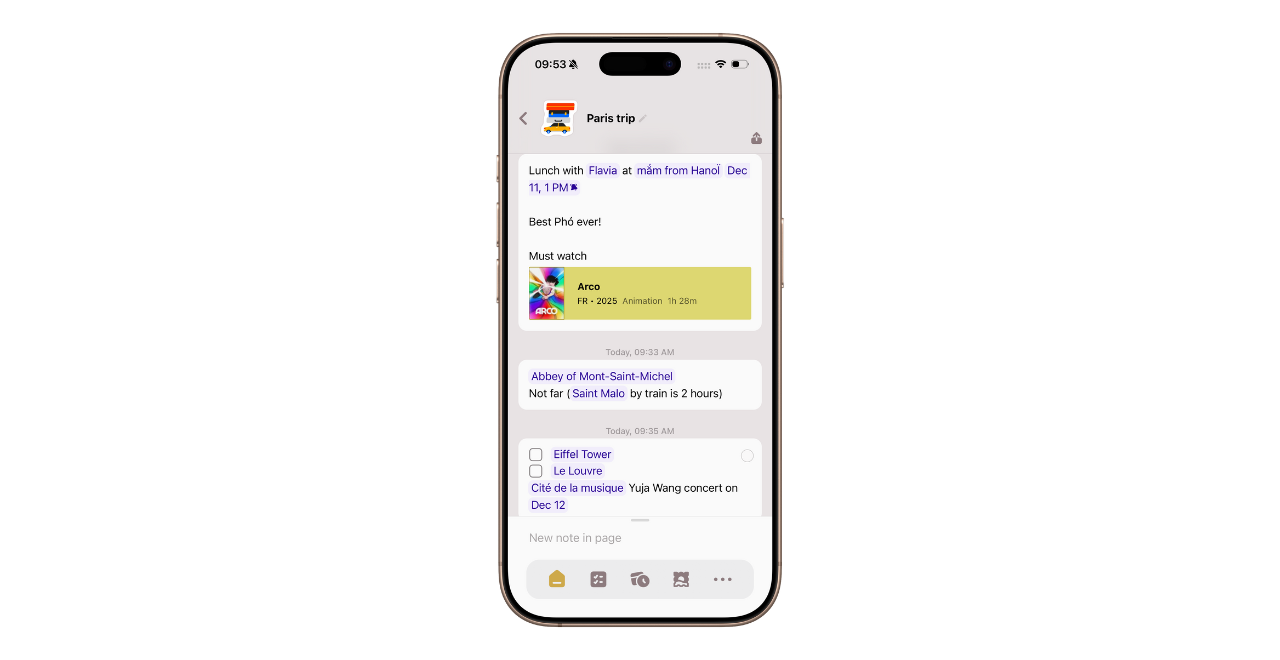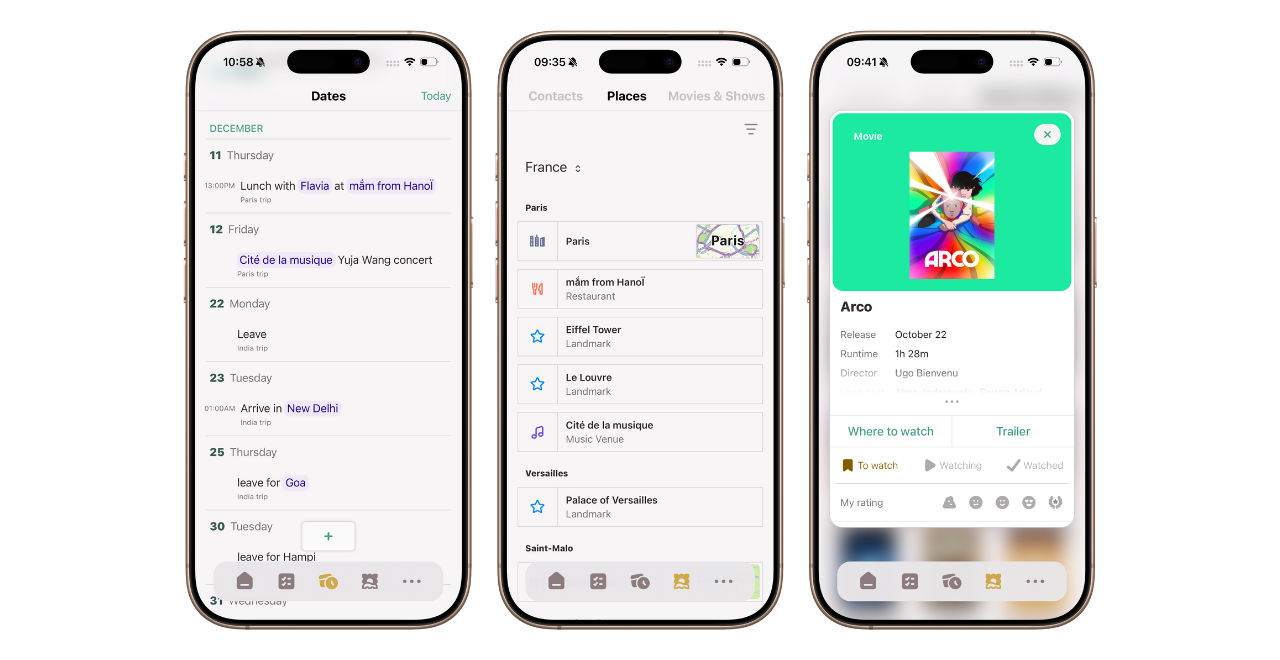Welcome to this edition of our Tools for Thought series, where we interview founders on a mission to help us think better and work smarter. Gregorio Zanon is the founder of Popt, a mobile notes app built for seamlessly connecting ideas, contacts, places and time.
In this interview, we discussed the nature of mobile note-taking, developing a product culture of digital privacy, why it makes sense to navigate our notes as an interconnected map, and much more. Enjoy the read!

Hi Gregorio, thank you for joining us. You built Popt around the idea that note-taking should be quick, private, and intuitive. Can you tell us about the moment you realized there was room for something different?
Mobile note-taking is very much its own thing – it’s not about sitting down to write an essay or organize a knowledge base. It’s about capturing thoughts in motion. Say you’re in a conversation, or walking out of a meeting, or halfway through a film, you don’t want an app that makes you think about structure and hierarchies. You just want to jot something down.
At the same time, our smartphones pack an insane amount of power, so why not leverage that and enhance how useful mobile notes can be?
With Popt, we want to bring the depth of networked note-taking to mobile, without slowing you down. Instead of hashtags or manual links, you link real-world objects as you type: people, places, dates, movies… Those tags add extra dimensions to your notes, turning them into reminders, contact cards, maps and collections – all without ever forcing structure on you.
We also made a deliberate choice not to rely on cloud-based LLMs such as ChatGPT. Your notes should be a safe space. You shouldn’t have to wonder where they’re going or who could read them. Sending them to an opaque server would be slow, waste resources, and compromise your privacy. So we built our own text analysis pipeline that runs entirely on-device. It’s not an AI, but a human-designed layer of tagging suggestions that helps you connect things together without interrupting your flow.
You’ve said that note-taking should “work the way your mind works.” How did that shape the way you’ve approached design and development?
Let’s slightly rephrase for emphasis: “Note taking should work the way your mind works.” Now, of course we don’t know how your mind works.
So we try to do the next best thing – to support diverse note taking flows. For example, you can use the notepad at the bottom of the screen as a scrapbook to jot down a quick shopping list. Or to start a new page. Or add a note to an existing page. You can name pages and pick cute stickers to make them stand out. But you can also entirely ignore pages and just have a list of plain notes, à la Apple Notes.
You can accept a tagging suggestion as you type, or keep going – the suggestion will simply disappear, until you move the cursor back to where it made sense. You can set a reminder for a day (without setting a time). Or for a week (without picking a day). Or for next year. And be more precise later – or leave it fuzzy.
Popt strives to stay out of your way and let you do your thing, in whatever order you see fit. You don’t have to tag / name / choose / organise, but you can if you choose to.
Let’s talk about how Popt works. A core feature is that it automatically recognizes people, places, and dates as you type, turning plain text into an interconnected map of your life.
Instead of manual tags, Popt offers to link your words to the real world, which is more human and much less taxing for your brain than having to think about a tagging scheme. It sounds pretty abstract so I’ll give an example – let’s say I’m planning a trip to Paris in December.
Because I’m a foodie, the first thing I want to do is book lunch at my favourite vietnamese joint there. I open Popt and write in the notepad: “Lunch with Flavia at mam from hanoi dec 11 1pm.”
As I type, I accept Popt’s tagging suggestions for my sister Flavia, the restaurant Mam from Hanoï, and the date. Here’s what the note looks like when I’m done:

I press the bell icon to set a reminder, and submit the note just like you’d send a message. I’ll return to it later to add more trip planning items.
A few weeks pass and I’m finally having that delicious noodle soup with my sister. As we chat, she recommends a movie, Arco. I easily locate the note about our meeting, through the Dates tab (it’s just there under Today), and add the movie thanks to our integration with The Movie Database:

You can see that I turned the initial note into a page named Paris trip, and added a few more notes to that page. I can quickly insert a comment about the food, and the movie suggestion, which becomes a widget.
In just a few words, I’ve linked together a moment in time, a place, a contact and a movie. Places show up in a dedicated tab, reminders and dates on an agenda-like timeline, and movies in their own collection:

I can get directions to the restaurant, watch the trailer for the movie, and call my sister to let her know I loved it, all from the same note. Not bad!
You often talk about your deep respect for privacy, and everything happens on-device. Why was that so important to you?
We’re based in Switzerland, a country where privacy is very much part of the culture. But even beyond that, would you feel comfortable taking notes knowing that the thoughts you commit to your phone can be read and analysed by third parties? We think it’s 100% worth the extra hassle to make sure that Popt can work fully offline and that your words are yours only.
For now, Popt doesn’t sync to any cloud so the problem remains relatively simple – the notes just don’t leave your phone. And when Popt needs to connect to an external service, like The Movie Database or Apple Maps, we never send text from your notes to those services – instead, we show you a search box that’s clearly clearly labelled to make sure you’re aware that what you type there isn’t 100% private anymore.
On the flip side of the privacy coin is data ownership. You own your notes and can export them in bulk as plain text files. Our export format is also compatible with Obsidian, so that if for any reason you want out, you can always export them to another app or device and browse your Popt content without requiring paid software.
What about you, how do you use Popt?
I personally use Popt multiple times a day. The most common notes are quick to-dos and reminders, but I also plan trips, list movies and grow a collection of my favourite foodie joints. Then, I should mention that I document Popt bugs in Popt – whenever I notice something that doesn’t work as it should, I add that to my Popt Bugs page, which is very meta… I’ll let you guess the sticker I chose for that one.
Finally, a good use case for the sharing feature came up very recently. My wife and I were both extremely busy last week so her dad stayed with us and helped with the kids. We made a Popt page for him, containing a daily schedule for school hours, music and swimming lessons, and the birthday party one of them was invited to.
The page also included tags for places and contacts, so it was super easy for my father-in-law to get directions, call a parent or teacher if needed, and even add reminders to any of the numerous items on schedule. Definitely a proud moment 🙂
And finally… Looking ahead, what’s next for Popt?
We soft launched Popt barely 2 months ago and still think of it very much as our baby app. Of course, we’d love to add more refined suggestions, more tag types (books, games, music), more sharing options, more platforms… but as a small team we have to take things one at a time and prioritise features which our users need the most.
It’s super easy to give Popt a whirl and send feedback our way – no sign up and no paywall, just Popt. We hope your readers will give it a go!l
Thank you so much for your time, Gregorio! Where can people learn more about Popt?
Thank you! You can visit our website, blog, and follow our updates on LinkedIn, Instagram, and TikTok.
